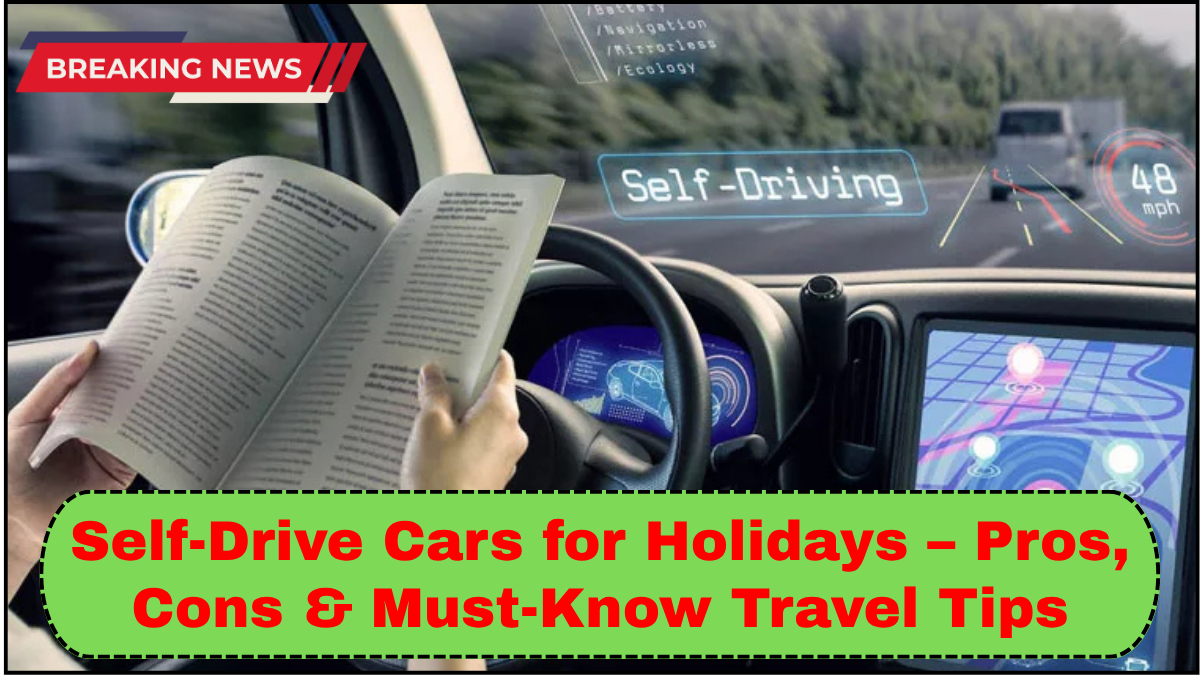Planning a vacation often sparks one big question: Should you drive yourself or rely on public transport or hired rides? Self-drive cars have become an increasingly popular choice for holiday-goers who want control, privacy, and adventure on their own terms. But before you hop behind the wheel, it’s essential to weigh the pros and cons and understand a few critical travel safety tips to make your road trip enjoyable and hassle-free.

Advantages of Choosing a Self-Drive Car for Your Holiday
1. Complete Freedom and Flexibility
The biggest advantage of using self-drive cars is freedom. You’re not tied to bus schedules, taxi availability, or guided tours. Want to detour to a hidden waterfall or extend your stay at a coastal town? You can.
2. Cost-Effective for Groups
For families or groups of friends, renting a self-drive vehicle often turns out to be more economical than booking multiple train or flight tickets. Sharing fuel and toll costs also keeps the overall expense low.
3. Comfort and Privacy
Having your own vehicle means no cramped buses or eavesdropping strangers. You can enjoy your music, make spontaneous stops, or rest without the pressures of public timelines.
4. Access to Remote Locations
Self-drive cars are ideal for exploring destinations where public transport is limited or non-existent. Think of offbeat hill stations, forest reserves, or rural heritage sites—places where guided tours don’t typically go.
Disadvantages You Should Consider
1. Responsibility and Risk
Driving in unfamiliar terrain or foreign countries can be stressful. You’re responsible for any traffic violations, damages, or accidents unless you’ve opted for comprehensive insurance.
2. Navigation Challenges
GPS isn’t foolproof—especially in remote areas where signals can drop. If you’re not confident navigating without assistance, self-driving may complicate your trip.
3. Driving Fatigue
Long road trips can be exhausting, especially if you’re the only driver. Fatigue not only affects enjoyment but also compromises travel safety.
4. Local Driving Rules and Permits
In certain countries or regions, international driving permits (IDPs) are mandatory. Some rental companies also have strict rules on vehicle usage, insurance limits, or mileage caps.
Must-Know Travel Tips for a Smooth Self-Drive Holiday
1. Choose the Right Car for the Terrain
Planning a mountainous trip? Go for an SUV with good ground clearance. Exploring a city? A compact car makes parking and maneuvering easier. Always match your vehicle to the environment.
2. Book in Advance
During peak travel seasons, demand for self-drive cars spikes. Booking early not only ensures availability but also lets you compare rental deals and avoid last-minute price hikes.
3. Inspect the Vehicle Thoroughly
Before driving off, check for dents, tire condition, brake functionality, and fuel level. Photograph any existing damage to avoid disputes later.
4. Prioritize Travel Safety Essentials
Keep a travel safety checklist:
-
First-aid kit
-
Emergency contact numbers
-
Car charger or power bank
-
Extra drinking water
-
Spare tire and tools
Also, ensure your rental agreement includes 24/7 roadside assistance.
5. Understand Local Traffic Laws
Ignorance isn’t an excuse when you’re pulled over. Read up on speed limits, alcohol limits, and rules like “right of way” in the region you’re visiting.
6. Limit Driving at Night
Driving after dark, especially in remote or poorly lit areas, increases risk. Plan your routes so you arrive at each stop before dusk whenever possible.
Frequently Asked Questions (FAQ)
Q1: Is it safe to use self-drive cars for long-distance travel?
Yes, self-drive cars are generally safe if you’re a responsible driver and follow standard travel safety practices like route planning and vehicle maintenance checks.
Q2: What documents do I need to rent a self-drive car?
Typically, you’ll need a valid driver’s license, proof of identity, and sometimes an international driving permit depending on the country. Credit cards are usually required for security deposits.
Q3: Can I rent a self-drive car without a credit card?
Some rental services allow debit card payments or cash, but many require a credit card for holding the security deposit. Always check with the provider beforehand.
Q4: What if the self-drive car breaks down mid-journey?
Most reputable rental companies offer 24/7 roadside assistance. Save the emergency contact details and rental agreement so you’re prepared.
Q5: Are there mileage limits on self-drive rentals?
Some rentals come with daily or trip-based mileage limits. Exceeding them may incur additional charges, so clarify the terms before booking.
click here to learn more